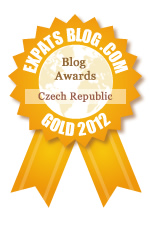 Yesterday was the 9th annual Pride Business Forum in Prague. Like last year, this is the only platform in Czechland for open discussion of LGBT equality in the workplace across companies. This year's theme was Equality in the Workplace: It's Easier Than You Think.
Yesterday was the 9th annual Pride Business Forum in Prague. Like last year, this is the only platform in Czechland for open discussion of LGBT equality in the workplace across companies. This year's theme was Equality in the Workplace: It's Easier Than You Think. |
| Team IBM |
For the second year there were LGBT Friendly Employer awards. This year 1st place went to Vodafone, 2nd place went to Accenture and 3rd place went to ExxonMobil.
 One of the workshops was about the difficulties people have transitioning in the Czech Republic. I doubt that's an easy process anywhere. About 50-60 people transition each year in ČR.
One of the workshops was about the difficulties people have transitioning in the Czech Republic. I doubt that's an easy process anywhere. About 50-60 people transition each year in ČR.- A person is formally diagnosed with "transsexualism." This requires approval from a physician and a sexologist.
- Trans people are required to divorce their spouse or same-sex registered partner.
- Then come hormone treatment for a year.
- Next comes the "real life test," where people have to live day-to-day full-time in their new gender.
- Mandatory sterilisation.
- Czech grammar is rigid when it comes to names. Trans people must change they name to a neutral version which means they can only pick from a few dozen possible names. A neutral suffix is used with their surname.
- After all of the previous conditions have been completed, the patent has to appear before a board of doctors, psychologists, and lawyers who determine if the he or she is in good mental health and has fulfilled the requirements for surgery.
- Only after the surgery is complete can the patient apply for a legal gender change so that the gender on their ID matches their new gender.
- The patent may then decide to keep their gender neutral name or select a new female or male name to match their new legal gender.
Apparently the process to change genders in Czechland is among the most difficult in the EU. The policy of mandatory sterilisation surgery has been ruled in violation of the European Committee of Social Rights. So the policy violates European law but none the less it is still required.
Yesterday's workshop was very educational. It gave me an appreciation for just how difficult it is for a trans person to go through his or her transition. Plus several things that can be an issue for trans people in the workplace. For example, HR may not be able to check employee references of a candidate because a former employer may know the candidate only by a previous gender and not the new one.
Update: Here's a short video I found of the conference out on YouTube.
©Pride Business Forum




























Why must they be divorced/separated from their partner? That's shocking! Are they no longer allowed to marry anyone then? And being limited to only gender neutral names for a whole year is potentially degrading, and also, highly inconvenient. So one would have to get ANOTHER set of IDs and inform their banks, telephone companies, etc. of a third name change.
ReplyDeleteThe mandatory sterilisation is dehumanising (what is this? Eugenics?) and the surgery requirements potentially make transitioning impossible for people with blood disorders.
This was very informative and also, very sobering. Hurts to see it's so hard for trans people to simply exist in the Czech Republic. Thanks for the post.